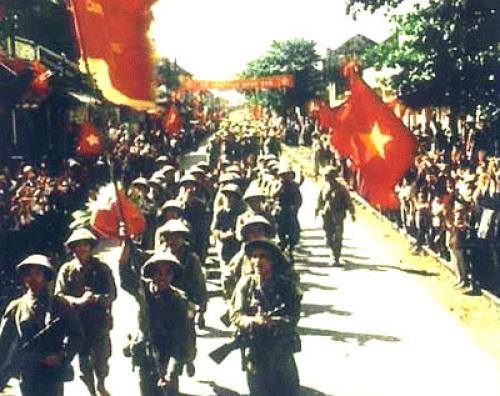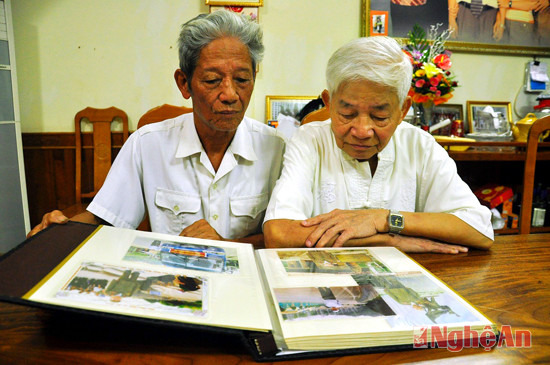Hanoi bursts into song
(Baonghean.vn) - Time has flown by, and it has been 60 years since the sacred Capital returned completely to the heart of the Fatherland. Looking back at the atmosphere of the days when "The Five City Gates welcomed the advancing troops".Like a flower platform welcoming the blooming of five peach petals", we met again the soldiers of Nghe An in the past, in the army, heroic and confident about taking over beloved Hanoi, the heart of the whole country.
Among the victorious troops returning to the Capital amidst the radiant joy of the victory day 60 years ago, there were many soldiers who were sons of Nghe An. From the Vanguard Army Corps (Division 308), Division 350, 316 to Regiment 57 (a unit established in the Soviet homeland)... the soldiers of Uncle Ho's beloved homeland had made a long march through Tu Vu, Phay Khat, Na Ngan, through the Thu Dong, Bien Gioi, and Thuong Lao campaigns to join forces to create a historic Dien Bien. Closing the glorious "golden history", one autumn day in October, together with the army from all over, they marched to take over beloved Hanoi.
 |
| The army marched to take over the capital on October 10, 1954. |
Living humbly with his second son (Bui Xuan Duong) in the quiet Bui Huy Bich alley in Phuc Loc hamlet (Hung Loc), Mr. Bui Van Hoe (87 years old this year) looks more like a reclusive old man than a colonel who has gone through many glorious battles. Then, when the country was quiet from the sound of bombs and bullets, he retired with the rank of colonel, as Deputy Director of the Political Department of the 3rd Army Corps. In his airy, simple house on a sunny afternoon, we were taken back to the days 60 years ago, when the troops marched joyfully towards Hanoi.
 |
| Mr. Bui Van Hoe (right) and Mr. Pham Duc Minh review photos of the days of taking over the capital. |
From the early days of October 1954, the French army had to withdraw from Hanoi. France handed over to us the capital Hanoi, the towns in the plains, the 300-day zone including Hai Phong and Quang Ninh (after 300 days, the takeover work was completed). The situation in the capital at that time was quite chaotic. The whole of Hanoi had about 600,000 - 700,000 people, but after they all left, only about 300,000 people remained. Most of them were people whose husbands and children went to fight in the resistance war, and poor people.
On the morning of October 10, 1954, in the formation of Company 11 (Battalion 3 - Regiment 53 - Division 350), soldier Bui Van Hoe and his comrades got off at Dong Van station (Ha Nam) and began marching to the Capital. At that time, our soldiers were all wearing the same "36 arduous roads" garrison shirt, woven hats covered with parachute fabric, and military insignia made of fabric, but the spirit and joy were bright on the faces of all those who had just gone through the sacred resistance war of the nation with a sky that had just become clear again.
Mr. Hoe recalled that, at that time, it was late afternoon, his unit and many other units had just arrived in Hanoi. “Passing through the Ha Dong area, people stood on both sides of the road, with colorful flags and flowers welcoming the troops, but when we reached the Thanh Xuan area, the atmosphere was quite quiet, because in reality, the people in this area were still in the area controlled by the French army. But just a moment later, when they saw the troops returning in increasing numbers, the people began to rush out. Along both sides of the road, along the streets where we marched, everywhere we could see people, running, calling each other with joy: “You guys are back! Hooray, you guys are back!”, “Our troops are back! Our army has returned!” There were women who were old, but still jumped up and down like children. Some brought chairs, some tables, fruits, everyone tried to bring something to entertain the soldiers… The pots of water that the people brought out for the soldiers were all black from the smoke. We saw tears in the corners of many people’s eyes.”
At the Vong intersection, his unit turned left to Bach Mai airport and rested. That evening, General Vo Nguyen Giap came to visit immediately. The first thing the Commander-in-Chief asked was, "Are you all well? The capital is looking forward to your return, there is still a lot of work to do." Mr. Hoe recalled, "I participated in both takeovers: the capital and Saigon City. But when I returned to the capital, I felt so passionate and moved. Perhaps because among the people waving and jumping for joy to welcome the returning troops, they also welcomed their fathers, husbands, and children walking among the victorious troops. Everywhere I went, I saw an explosion of joy. Red flags with yellow stars were in the hands of children and old people, on every corner of the wall, floor of the house, and row of trees."
Continuing the story, Mr. Pham Duc Minh, a neighbor and comrade of Mr. Hoe, a former soldier of Company 3 (Battalion 11 - Regiment 600 - the Central Party protection unit) proudly told about his years in the army, in the same squad with heroes Be Van Dan and Chu Van Mui.
On October 10, 1954, in the 600th Regiment, the unit marched from Son Tay to Hanoi. Following the flags and the joy of the people of the Capital on the day of liberation, the unit immediately began to take over the positions of the Water Station, the Armed Police Command, and the 108 Institute (now). His 11th Battalion was honored to protect important agencies of the Central Committee. Mr. Phan Duc Minh recalled: "One night, during my shift on guard, a stranger asked to enter, I definitely did not agree. When the guard came out, I realized that it was General Vo Nguyen Giap. I did not know his face, so I did not let him in, that's all. At that time, the General immediately praised: "You comrades protected the target very well. Thank you comrades".
Among the troops that took over the Capital that day, there were units that were not able to join in the atmosphere of victory flags and flowers and tears of joy. Those were the ones who carried out special missions. Colonel Tran Quoc Hanh, former Vice Principal of the Air Force High School, who was then the Propaganda Officer of Regiment 57, said: My unit was the Cung Team, established in Nghe An since the August Revolution in 1945 (descendants of the Red Self-Defense Soldiers in the Nghe Tinh Soviet Movement). In 1950, when our army established the main divisions, the team was assigned to Division 304 and was called Regiment 57. The unit was assigned a very important mission: Taking over the Capital on October 9, 1954, as a vanguard for Division 308 to officially take over the next day.
At exactly 6:00 a.m. on October 9, 1954, the 57th Regiment received orders to depart for Hanoi. From Chuc Son, the entire regiment marched in neat formation through Ha Dong town amidst a crowd of people waving flags and flowers in welcome. Arriving at Phung Khoang, our scouts reported: The enemy was deploying a column of tanks and armored vehicles at Nga Tu So. Here, after our officers in the Joint Armistice Committee protested against the French side deploying tanks and armored vehicles in front of our advance route as being unfriendly, the French side explained that it was "following the handover ceremony of their army", but still immediately withdrew those vehicles from the contact area, the handover began. Our troops, guns in hand, advanced under the guidance of the Vietnamese and French officers in the Joint Armistice Committee, one by one, to replace the French soldiers standing guard at each position of the 21 watchtowers and the empty facilities of Bach Mai airport. The signing of the handover minutes was carried out in a rather large hangar. There were quite a number of foreign journalists witnessing this handover. They were surprised to see our commander communicating fluently in French and continuously taking pictures of our soldiers' equipment from canvas shoes, bamboo hats, water bottles to submachine guns...
By 12 noon on October 9, the takeover of the main areas was completed, the Regiment was in combat position, ready to ensure safety, security and order for October 10, 1954, when our army officially entered the capital.
He recalled: "Wherever our troops went, the people cheered loudly: "Hooray, cheers to Uncle Ho's troops". The "advance" takeover of Regiment 57 on October 9 was different from the units taking over on October 10 in that: We took over in a combat-ready position, directly in contact with French soldiers through the supervision of the International Commission, the Vietnam - France Joint Inspection to carry out the task, creating a foothold and protecting the main army the next day to march solemnly and safely... A special thing was that taking over Hanoi had 2 typical regiments: Regiment 102 - Capital Regiment was established right in the heart of Hanoi, when the National Resistance broke out; secondly, Regiment 57 was formed in Uncle Ho's homeland, since the August Revolution in 1945, mainly children from Nghe An and Ha Tinh provinces, descendants of Red Self-Defense soldiers.
Mr. Kieu Huu To (now in Hung Chinh - Hung Nguyen) was one of the eight people from Nghe An chosen by the Prime Minister's Office to work there since the end of 1952. The group of eight soldiers from Nghe An included security guards, food handlers, and secret agents. Mr. To was responsible for protecting the inner circle. Together with his teammates, he once brought the wife of Mr. La Quy Ba (the first ambassador of the People's Republic of China in Vietnam) back to the country safely. He also joined the delegation to Sam Neua (Laos) to welcome Prince Souphanouvong's family back to the Viet Bac resistance base.
About a week before the day of taking over the capital, his unit was ordered to march by motor vehicle from Son Tay to Hanoi, resting at the former French hospital (now the Viet-Xo Hospital). His unit returned when the capital was already asleep. Quietly, the soldiers with the mission of serving and protecting the Presidential Palace and important agencies of the Party Central Committee quickly deployed their tasks, waiting for the day the army marched back with a triumphant song of victory. He said: "At that time, we were a little sad. We returned quietly, without being welcomed like our comrades. But then, we felt more proud than anyone else, because we were assigned a very important task that few people are easily assigned to: protecting the Presidential Palace and other important agencies." A week later, when President Ho officially introduced himself to the nation, Mr. Kieu Huu To was able to appear with his comrades, with the task of a guard soldier, under the majestic and solemn autumn sky of Hanoi on the day of his introduction.
(To be continued)
Tran Hai






